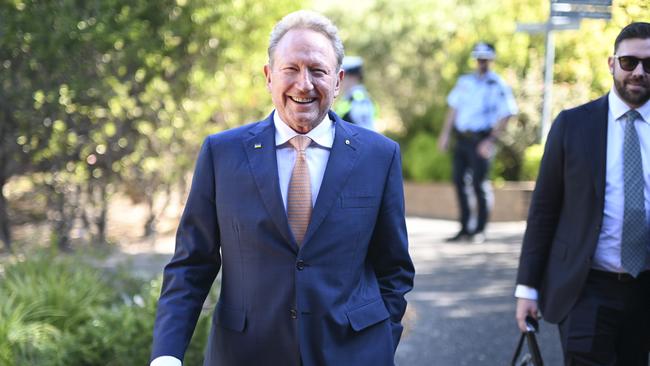Parliamentary inquiry recommends sweeping changes to rein Facebook and other social media giants to combat ‘wicked problem’
Andrew Forrest has backed sweeping changes a parliamentary inquiry has recommended to plug a legal loophole and force Facebook owner Meta and other social media giants to comply with Australia’s laws.

Mining billionaire Andrew Forrest has welcomed sweeping changes a parliamentary inquiry has recommended to plug a legal loophole and force Facebook owner Meta and other social media giants to comply with Australia’s laws and be more accountable for the scams that plague their apps..
The inquiry released its report, titled the ‘social media: the good, the bad, and the ugly’ also said Meta and others be forced to pay a ‘digital platform levy’ to help fund mainstream media outlets and combat disinformation.
Meta has refused to renew deals to compensate media companies for using their content and has threatened to withdraw mainstream news articles from its platform – a move that could drain almost $100m from Australian newsrooms.
The inquiry examined how social media affected Australian’s mental health, particularly in more vulnerable people, while considering the more positive aspects of the digital age such as providing a “sense of community, a place for expression and instant access to information and entertainment”. It said “balancing these conflicting realities is a wicked problem”.
Dr Forrest’s likeness has been used to fleece Australians of the life savings for the past decade on scam advertisements that have appeared on Facebook, with the billionaire claiming Meta snubbed his repeated calls to combat online crime. He even wrote a letter to Meta founder and chief executive Mark Zuckerberg but never received a reply.

Dr Forrest is now suing Meta in the US to test a 30-year-old law, known as Section 230, that gives US social media companies immunity from what users post on its platform, which Meta says extends to advertising.
He said he was suing the tech giant in California because the company claims it’s not subject to Australian law, despite having about 11.5 million users here and raking in between $4.7bn and $5.1bn in Australian advertising revenue a year.
The parliamentary inquiry recommended that the Australian Government consider options for greater enforceability of Australian laws for social media platforms, including amending regulation and legislation, to effectively bring digital platforms under Australian jurisdiction.
“Australians are subject to substantially fewer protections and options for remedy or redress than many other jurisdictions, including the United States, and Europe,” the inquiry’s report said.
“To compound this, most platforms, including Meta, have a limited, or no, local legal presence in Australia, which makes serving or enforcement of legal options very difficult for Australian users.”
Dr Forrest’s senior legal counsel Simon Clarke said self-regulation by social media companies has been an “utter failure” and the parliamentary report brought “legislative change a step closer”.
“These incredibly profitable companies, based in the US but clearly doing business in Australia, must be held responsible for the violations of law they commit, here on Australian soil,” he said.
“Social media giants, such as Meta, must be forced to submit to Australian law for all purposes. Right now our courts and regulators are powerless to enforce Australian judgements and regulatory decisions. Voluntary codes are not enough to stamp out the devastating impact that fraudulent ads and scams running rife on these platforms, have on the lives of innocent Australians.”
The inquiry also examined Meta’s decision to “abandon deals” under the news media bargaining code and the “important role of Australian journalism, news and public interest media in countering mis and disinformation on digital platforms”.
“The committee recommends that, acknowledging the limitations of the News Media Bargaining Code, the Australian Government explore alternative revenue mechanisms to supplement the Code, and contribute to systems oversight, such as a digital platform levy.
“Exploration should include consideration for preserving current and future commercial deals to sustain public interest journalism over the longer term, and to support digital media literacy initiatives.
“If the News Media Bargaining Code is to be redesigned, the committee recommends that the Australian Government revisit the tests for registration of news businesses under the News Media Bargaining Code to ensure their design does not present an unreasonable barrier to registration for small, independent or digital only publishers.”




To join the conversation, please log in. Don't have an account? Register
Join the conversation, you are commenting as Logout